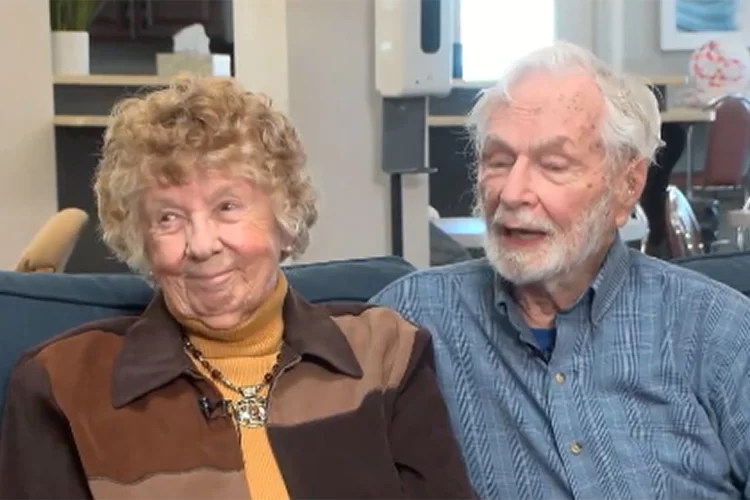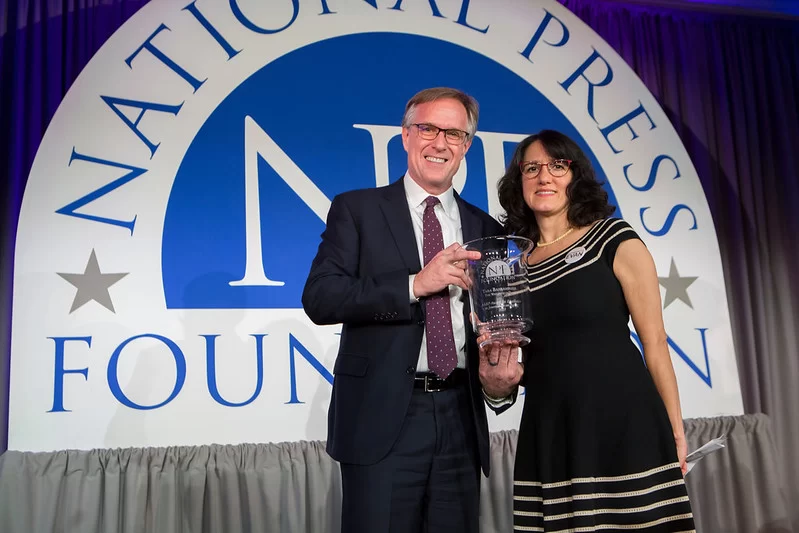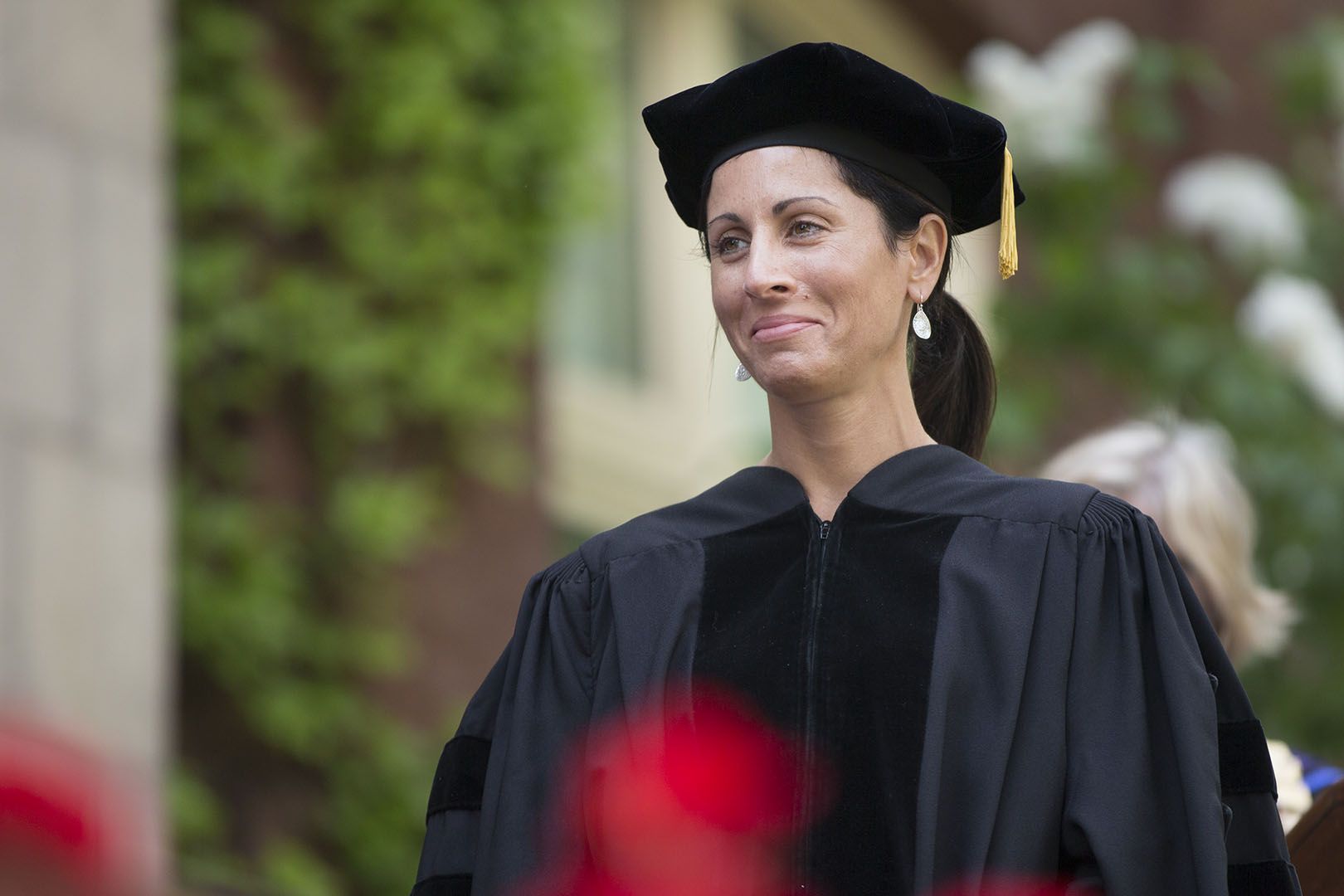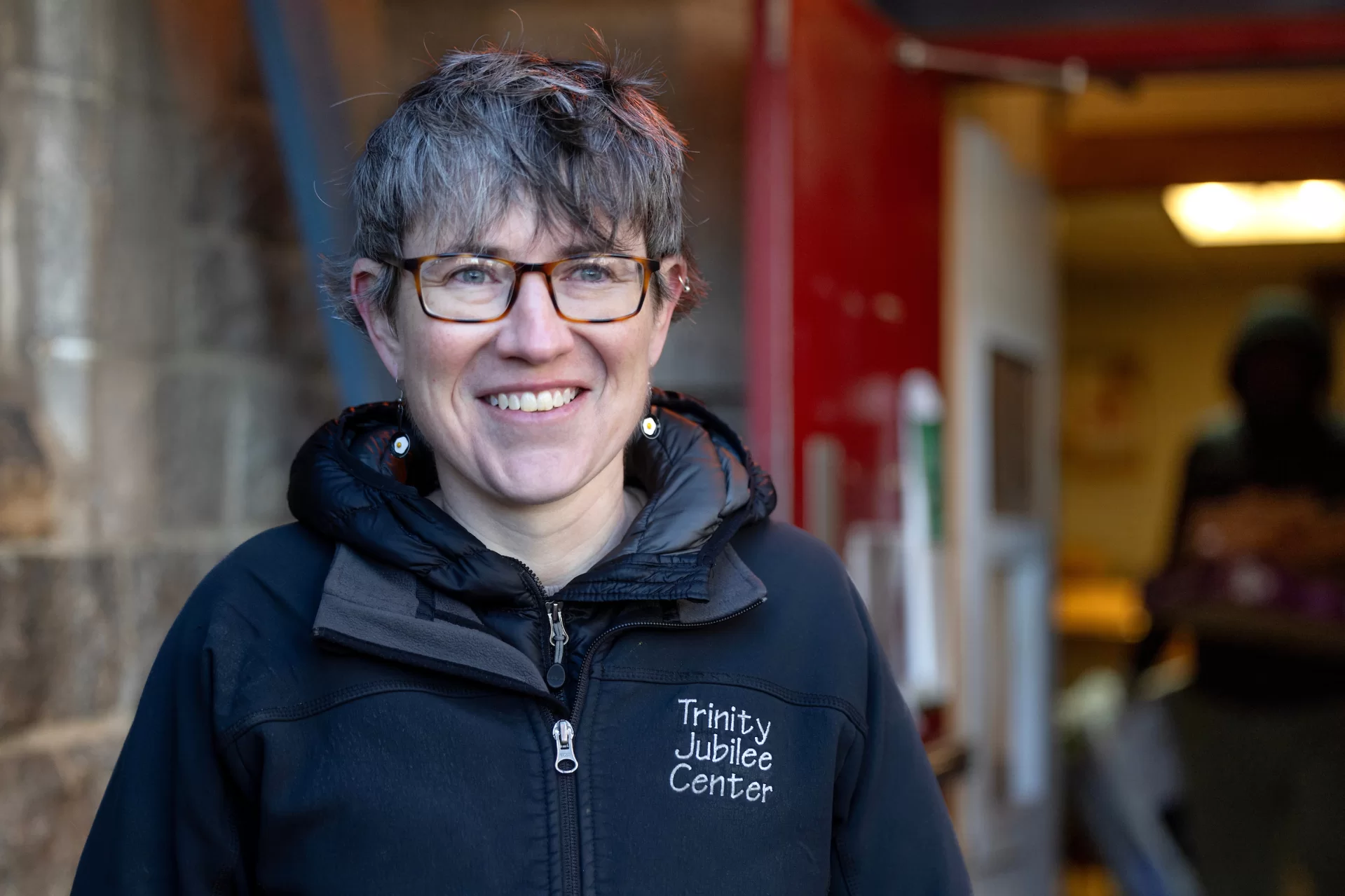
Bates in the News: March 29, 2024
A selection of recent mentions of Bates and Bates people in the news.
Ginger Buhl Vetrano ’54 and Jim Vetrano ’51
‘I’d stay with him forever’ — Apple Valley News Now
A Valentine’s Day feature by Apple Valley News Now, a television news program based in Kennewick, Wash., profiled Ginger Buhl Vetrano ’54 and Jim Vetrano ’51, who have been married for 71 years. He is 94; she is 92.

The couple met at a spring Bates picnic during her first year and his junior year. “We both went with different partners to the picnic, and I thought she was pretty cute,” Jim said. “We were playing softball; she was the pitcher, and I was the catcher. There were a lot of conferences on the mound.”
They were married on Valentine’s Day, which happens to be Jim’s birthday. As they planned their wedding, Ginger said, “I noticed that it was his birthday, which meant that he wouldn’t forget our anniversary — and he never has!”
Takako Yamaguchi ’75
Dozens of artists, three critics: Who’s afraid of the Whitney Biennial 2024? — The New York Times
Artwork by Takako Yamaguchi ’75 is mentioned favorably in a New York Times review of the Whitney Biennial, considered the longest-running survey of American art since the Whitney Museum of Art established the exhibition in 1932.
Yamaguchi’s “curious and colorful graphic abstractions” are described as one of the show’s “standouts.” Born in Japan, Yamaguchi has been based in Los Angeles since 1978. She blends global art influences, challenging Euro-American abstraction. Her work combines Japanese motifs with diverse visual traditions, emphasizing overlooked themes like decoration and beauty.
Bill Walsh ’86
The AARP Award for Excellence in Journalism on Aging — National Press Association
The National Press Association reported on a major new journalism award whose creation was led by Bill Walsh ’86, a former newspaper journalist and now an executive at AARP.

Walsh, who is senior vice president of communications at AARP and a National Press Foundation board member, presented the inaugural National Press Foundation/AARP Awards for Excellence in Journalism on Aging at the NPF awards dinner in February.
The two awards went to The Washington Post reporter Tara Bahrampour, the paper’s first reporter dedicated to aging, and The Connecticut Mirror, for their four-part series, “Connecticut’s Elder Care Reckoning,” in February.
Walsh told BatesNews that he has “long thought a national award focused on covering aging could incentivize journalists to explore the many benefits and challenges of one of the greatest phenomena of our time: Increased longevity.”
Whitney Blanchard Soule ’90
Top women leaders for 2023 — Women We Admire
Whitney Blanchard Soule ’90, who is vice provost and dean of admissions at the University of Pennsylvania, was profiled by Women We Admire as a top leader for 2023.
The university’s first female dean of admission, Soule was praised as “a leader in envisioning the future of college admissions and the role of higher education in driving societal progress” and for being laser-focused on building greater equity in admissions.”
Theodore Walls ’90
New research to study eating behaviors through high-tech system — WJAR
Television station WJAR of Providence, R.I., reported on how researchers at the University of Rhode Island, including Theodore Walls ’90, have created wearable sensors and artificial intelligence to more accurately measure how people eat, even to the point of measuring how one’s jaw moves during eating.
Walls is a professor in the Department of Psychology and co-director of the Center for Health Monitoring and Intervention.
In a URI news story, Walls said that the study might allow the addition of other sensors, such as one that measures facial skin stretching during eating. The goal of the study is to be able to move from in-lab settings “into the wild, gradually moving from… a lab-controlled setting to those grounded in the external validity of the real world.”
Lisa Genova ’92
Memory and the brain — TED Radio Hour
Neuroscientist and best-selling novelist Lisa Genova ’92 joined NPR’s TED Radio Hour to talk with host Manoush Zomorodi about memory, what’s normal and not normal in our brains, and how to keep our brains healthy.
Genova, who received an honorary degree from Bates in 2016, has authored five novels, each about people suffering from a different neurological condition. Praised by The New Yorker, her latest book is the nonfiction Remember: The Science of Memory and the Art of Forgetting.

Genova spoke to Zomorodi about a common worry that people have of not remembering something that recently happened.
“And that’s okay,” she said. “It’s what I want people to recognize: You don’t have to freak out [about not remembering] Wednesday night dinner with my kids. Our brains are designed pretty well. If it’s meaningful, emotional, surprising, or new, we keep it and we can keep it for 70 years, 80 years. We can keep it for a lifetime if it’s meaningful and emotional and important. But if it’s not, it’s okay to let it go.”
Prerana Shrestha ’03
SBU’s Prerana Shrestha scores $2.2 million to study molecular drivers of PTSD — TBR News Media
TBR News Media reported that Stony Brook University researcher Prerana Shrestha ’03 will use a $2.2 million grant from the National Institute of Mental Health to better understand how the brain regulates especially intense emotional memories associated with Post-traumatic Stress Disorder.
Shrestha is an assistant professor in the Department of Neurobiology and Behavior in the Renaissance School of Medicine at Stony Brook.
In PTSD, physiological changes in the brain disrupt its subconscious evaluations of and reactions to perceived threats. As a result, sufferers have trouble accurately assessing danger and employing effective coping strategies.
“We are trying to understand the neurological basis for why [traumatic memories in PTSD sufferers] are so robust,” Shrestha told TBR News Media. She will look at “what can we do to understand the mechanism that supports these memories from the ground up.”
Erin Reed ’08
Plans for Trinity Jubilee Center’s new location taking shape in Lewiston — Sun Journal
The Lewiston Sun Journal reports strong progress on a plan for Trinity Jubilee Center, where Erin Reed ’08 is executive director, to move from rented space in cramped quarters in a Lewiston church basement to a new building in the heart of downtown that the Jubilee Center would own.

“Our programs have just grown and grown, and it’s hard,” Reed told the Sun Journal. “We feed people and we shelter people, and those two programs have to fight over space. Like, do we store a pallet of food in this corner or do we set up a table and chair and bring in another person from the cold?”
It’s also about helping clients retain their dignity. “Some people have a hard time asking for help, and it’s even harder when it’s crowded, and our staff members are always getting interrupted and there’s strangers listening in on conversations,” Reed said.
In March, the Sun Journal reported that Trinity Jubilee, other nonprofits, and riverfront restoration had received new federal funding to support their work. Groundbreaking for the two-story, 11,000-square-foot resource center is scheduled for August.
Shawna-Kaye Lester ’08
Shawna-Kaye Lester talks growth — All Woman
The founder and CEO of Memorable Essay, a college admission consulting firm, Shawna-Kaye Lester ’08 discussed her career achievements and motivations with All Woman, a magazine published by the Jamaica Observer, offering a few tips along the way.
Lester talked about the time in her life when she worked the hardest: taking the Bates course in cellular and molecular biology, long known as “Cell Hell.”
Young women beginning their professional career should feel free to “expose yourself to different fields and to different professions and professionals within each field. You can read about professions, but also try to see jobs in motion through internships, even if they are not paid.”
Lester encouraged: It’s OK to explore. “I have had eclectic career tastes my whole life and I dealt with a lot of people telling me I was not focused or confused when I was simply exploring. I think exploration and exposure are critical for finding your career match.”
Emily Russell ’11
If All Else Fails — North Country Public Radio
The five-part podcast If All Else Fails, produced by North Country Public Radio about far-right extremism in upstate New York, was hosted and reported by Emily Russell ’11 and Zach Hirsch.
The North Country Public Radio website notes that Russell and Hirsch set out to “investigate extremist groups and militia movements in northern New York State, why they’re drawing support, and what kinds of threats they pose at a pivotal moment for democracy in the U.S.”
“As we saw on Jan. 6, 2022, it only took a couple thousand people to suspend our democratic process for hours and force an evacuation from the Capitol,” Russell told VTDigger. “Even if folks who have gone down these rabbit holes may be a minority in this country, if you get enough of them riled up, they can do a tremendous amount of damage to our democracy in the U.S.”
Koyabi Mamam Nbiba ’20
The power of mentorship: Opening doors and shaping leaders — Mastercard
Koyabi Mamam Nbiba ’20, an analyst for Mastercard North America, wrote a first-person essay for the company’s “Perspectives” website about the role of mentorship in his career.
As a high school student, Nbiba was mentored by a doctor in New York City, discovering the “world of New England prep schools” that set him on the path to “securing a spot at Bates.”
At Mastercard, he has been the global finance chair for LEAD, which seeks to cultivate a corporate culture that attracts, develops, and retains employees of African descent, and program director for Uplift, MasterCard’s mentorship program for Black men.
“The truth is, you don’t have to be part of a mentorship program to shape the paths of future leaders,” Nbiba wrote. “Professionals should step up to mentor early and often. If that’s not your preference, you can still make a difference by connecting others for mentorship where you see opportunities. Maybe that’s how we can measure our legacy — by how many people we raise up along the way.”
Bates Purposeful Work
Financial planning careers are open for business — Kiplinger
A story in Kiplinger gave a nod to the groundbreaking work by Bates to show that a sense of purpose is integral to feeling satisfied in our careers. The thrust of the story was about the growing need for financial planners in the coming years, and how the field of financial planning can feel purposeful.
“The need for additional financial planning professionals aligns with many students’ desire to pursue a purpose-driven career,” the story noted. “Nationally, according to a survey from Gallup and Bates College, nearly all four-year college graduates (95 percent) consider a sense of purpose at least moderately important in their work.”
Loring Danforth
Cultural appropriation — Maine Calling
Dana Professor Emeritus of Anthropology Loring “Danny” Danforth joined a discussion on Maine Public Radio’s program Maine Calling to discuss issues of cultural appropriation, which can arise in relation to Halloween costumes or Indigenous imagery used by school, college, and professional sports as mascots.
As a professor, Danforth often sent an email to Bates students in the days before Halloween asking them to think about their costumes because “when you take somebody’s identity or culture and transform them into a costume for Halloween… that’s trivializing and disrespectful.”
Danforth returned to the idea of respect when a listener asked where cultural sharing ends and cultural appropriation starts. For example, Danforth said, eating at a Greek or Chinese restaurant is not disrespectful, but “using Native American religious symbols at a basketball game is not respectful. Using feathers, which are sacred symbols in Native American cultures, on a Halloween costume is not respectful.”
Joining Danforth as a panelist was Maulian Bryant, tribal ambassador of Penobscot Nation and an advocate on issues of derogatory mascots and imagery.
Brian J. Evans
Seeds in the SOIL, a new art exhibit celebrating Black history from Maine to Seattle — News Center Maine
News Center Maine reported on the Seeds in the SOIL exhibition in Portland, featuring nine Black artists from Maine, including Brian J. Evans, an assistant dance professor at Bates.
Evans’ showcased piece, Crazy, is a video depicting him running in place for 10 minutes, symbolizing the challenges of navigating multiple identities. “Essentially, I ask the audience to help me get through this experience. It’s a commentary on how crazy it is sometimes to be running through all of these different identities presumably not getting anywhere,” Evans said.
The exhibition was a collaboration between Portland’s Indigo Arts Alliance and Seattle’s SOIL Gallery.
Michael Rocque
The Maine gunman was a ‘textbook case’ for a state law designed to remove firearms from people like him — CNN
CNN quoted Associate Professor of Sociology Michael Rocque in a report on how law enforcement agencies had probable cause to take Robert Card into custody and remove his firearms before the mass shooting in Lewiston on Oct. 25, 2023.
Maine is the only U.S. state with a so-called “yellow flag” law, which is considered a less-effective version of the red flag laws in many other states that seek to stop dangerous people from accessing firearms.
“This is a textbook case for the yellow flag law,” said Rocque a criminologist who studies gun laws and mass shootings. “This is what it was intended for: somebody who is having a mental health crisis, who has demonstrated themselves to be a threat.”




